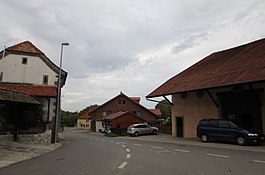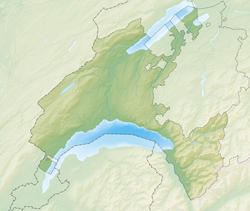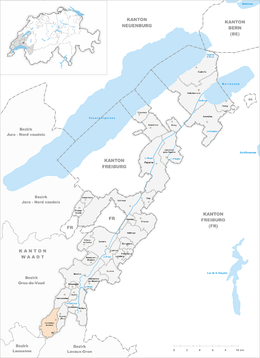Corcelles-le-Jorat
| Corcelles-le-Jorat | ||
|---|---|---|
 |
||
|
||
| Coordinates: 46°36′N 06°45′E / 46.600°N 6.750°ECoordinates: 46°36′N 06°45′E / 46.600°N 6.750°E | ||
| Country | Switzerland | |
| Canton | Vaud | |
| District | Broye-Vully | |
| Government | ||
| • Mayor |
Syndic Daniel Ruch |
|
| Area | ||
| • Total | 7.93 km2 (3.06 sq mi) | |
| Elevation | 783 m (2,569 ft) | |
| Population (Dec 2015) | ||
| • Total | 423 | |
| • Density | 53/km2 (140/sq mi) | |
| Demonym(s) | Les Corçallins Lè Grante-Coraille |
|
| Postal code | 1082 | |
| SFOS number | 5785 | |
| Surrounded by | Peney-le-Jorat, Hermenches, Ropraz, Montpreveyres, Froideville, Villars-Tiercelin | |
| Website |
http://www.corcelles-le-jorat.ch Profile (French), SFSO statistics |
|
Corcelles-le-Jorat is a municipality in the district of Broye-Vully in the canton of Vaud in Switzerland.
Corcelles-le-Jorat is first mentioned about 1140 as Corceleys.
Corcelles-le-Jorat has an area, as of 2009[update], of 7.93 square kilometers (3.06 sq mi). Of this area, 4.16 km2 (1.61 sq mi) or 52.5% is used for agricultural purposes, while 3.33 km2 (1.29 sq mi) or 42.0% is forested. Of the rest of the land, 0.46 km2 (0.18 sq mi) or 5.8% is settled (buildings or roads).
Of the built up area, housing and buildings made up 3.0% and transportation infrastructure made up 2.6%. Out of the forested land, 39.1% of the total land area is heavily forested and 2.9% is covered with orchards or small clusters of trees. Of the agricultural land, 28.1% is used for growing crops and 23.6% is pastures.
The municipality was part of the Oron District until it was dissolved on 31 August 2006, and Corcelles-le-Jorat became part of the new district of Broye-Vully.
The farming municipality is located at the intersection of the Lausanne-Moudon-Bern and Oron-Echallens roads. It consists of the village of Corcelles-le-Jorat and numerous hamlets.
The blazon of the municipal coat of arms is Or, a Rooster passant Sable lined Argent combed, beaked, langued, armed Gules.
Corcelles-le-Jorat has a population (as of December 2015[update]) of 423. As of 2008[update], 7.8% of the population are resident foreign nationals. Over the last 10 years (1999–2009 ) the population has changed at a rate of 1.5%. It has changed at a rate of -2.5% due to migration and at a rate of 3% due to births and deaths.
...
Wikipedia




